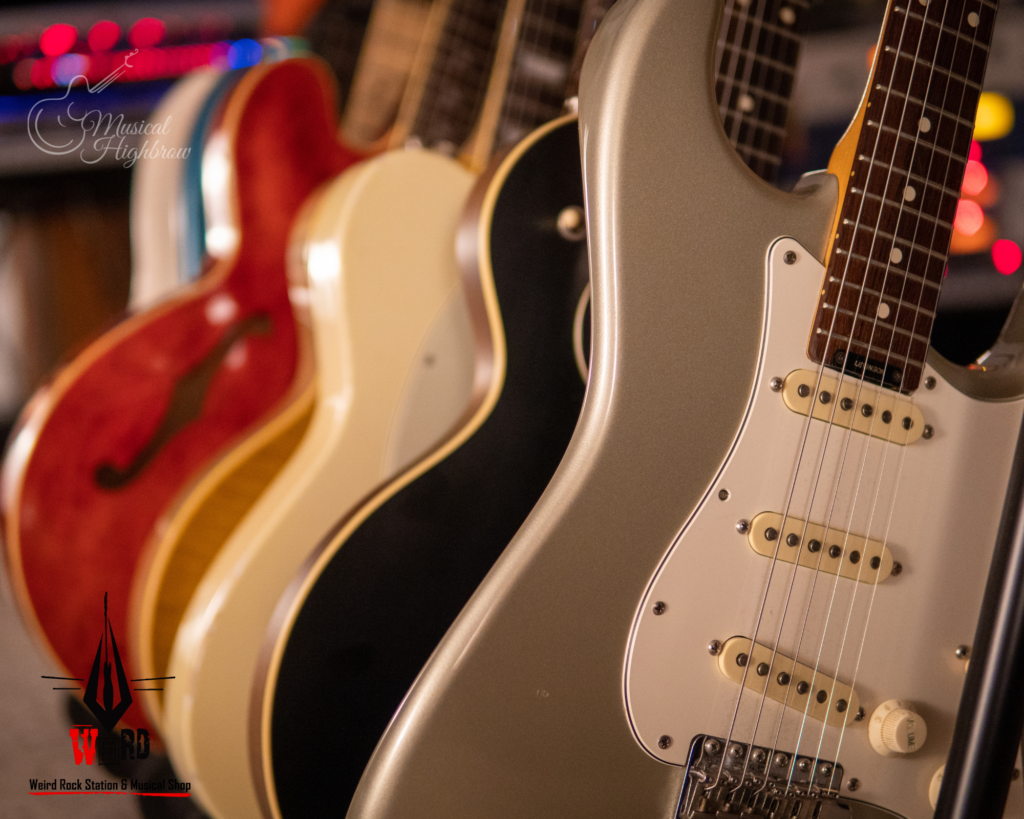
1. What are 3 facts about Electric Guitar?
Here are three facts about the electric guitar:
- Origination and Early Use: The electric guitar was invented in the early 1930s. One of the earliest models was the Rickenbacker “Frying Pan,” created by George Beauchamp and Adolph Rickenbacker. It was the first commercially successful electric guitar, featuring an electromagnetic pickup to convert string vibrations into electrical signals. Following this, other significant guitars were developed, such as the Gibson Les Paul in the 1940s and the Fender Telecaster in the 1950s. The Fender Telecaster was the first solid-body electric guitar to be mass-produced, while the Gibson Les Paul was the first experimental solid-body electric guitar.
- Role in Modern Music: In modern music, it is quite unimaginable to create a song without the sound of an electric guitar. You will find the sound of an electric guitar in almost every genre of music. In a baby rhyme, advertisement jingle, or a movie – you will find it everywhere. Before the invention of the electric guitar, the piano and violin were the leading instruments in Western music; but nowadays, you will notice an electric guitar in the church choir as well. In band music, even rap songs are created and improvised using the electric guitar.
- Diversification of Sound and Design: The electric guitar attracts musicians because of its unique designs and variation of sound. Electric guitars come in various shapes, like the “V-shaped” or “X-shaped” electric guitar played by James Hetfield from Metallica. On the other hand, John Petrucci from Dream Theater uses a Music Man electric guitar, which has a wider fretboard than any other regular electric guitar. You will see Adrian Smith from Iron Maiden playing a double-neck electric guitar while performing “Dance of Death.” Additionally, guitarists like Steve Vai have used 7-string electric guitars in many solos. The ability of an electric guitar to produce a variety of sounds makes it superior to other instruments. You can produce heavily distorted sounds and piano-like soft melodic sounds at the same time.
2. What is special about Electric Guitar?
Electric guitars are special because they revolutionized the music industry, offering unique features and capabilities that acoustic guitars cannot match:
- Amplification: The sound of an electric guitar is amplified by electromagnetic signals converted from string vibrations. This feature allows a guitarist to control the sound depending on the location of the performance.
- Variation of Sound: Electric guitars can produce a wide range of tones and effects. By using different pickups, tone controls, and effect pedals, guitarists can produce sounds ranging from bright and clean to heavily distorted. This versatility makes the electric guitar essential in almost all genres of Western music.
- Sustainability: The sound of an electric guitar has more sustain than that of an acoustic guitar because of its solid or semi-hollow body. Depending on the quality of pickups, the fading of sound may vary.
- Playability: Electric guitars generally have thinner necks, lower string-to-fretboard distances, and lighter string gauges, making them easier to play. Playing techniques like bending, sliding, screaming, and fast picking are easier on an electric guitar.
- Unorthodox Designs: Electric guitars come in various shapes and sizes, each with its own features. There are V-shaped, X-shaped, double-neck, wider fretboard, 7-string, and 8-string guitars, each with its own phenomenal sound. This variety of designs attracts attention on stage and sparks curiosity.
- Cultural Impact: Electric guitars have played a significant and central role in modern music, especially in band music, since their invention. They have influenced genres like rock ‘n’ roll, blues, jazz, and metal, where they have become symbols of revolution, creativity, and youth culture.
Overall, electric guitars have become special because of their adaptability, expressiveness, and influence on modern music.
3. What is the most important part of an Electric Guitar?
Undoubtedly, the pickups are the most vital element that differentiates an electric guitar from an acoustic guitar. The main role of a pickup is to receive string vibrations and convert them into electrical signals, which are then sent to an amplifier to produce sound.
Why pickups are crucial:
- Generation of Sound: Without a pickup, the sound of an electric guitar would not be amplified; it would only produce a faint sound. The pickup is what allows the sound of an electric guitar to be heard at a volume that can fill a room or a stadium.
- Tone Formation: The tone of the sound produced by an electric guitar significantly depends on the pickups. Different pickups produce different tonal qualities. Guitarists usually choose pickups according to the sound they want to achieve. Some pickups offer bright, crispy sounds, while others provide warm and thick tones.
- Variations: There are single-pickup guitars and multiple-pickup guitars. If you want to play songs from various genres, multiple-pickup guitars are best suited for you. They allow you to mix tonal characteristics and produce various types of sound. This feature makes the electric guitar a versatile instrument capable of fitting into every genre.
- Noise Reduction: It’s simple to understand that when string vibrations are converted into electrical signals, there will be unwanted vibrations that affect the principal vibration, such as air vibration or vibration of the guitar body. Quality electric guitars have humbucker pickups that reduce unwanted noise significantly to produce a clean sound. Single-coil pickups also have some noise reduction capacity.
In a nutshell, the pickup is the heart of an electric guitar, directly influencing the sound, tone, and overall performance.
